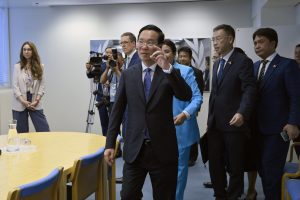Vietnam’s National Assembly has accepted the resignation of Vietnam’s President Vo Van Thuong, who has become the second president to step down in as many years amid a wide-ranging anti-corruption campaign.
In a statement yesterday, the Central Committee of the Communist Party of Vietnam (CPV) announced that it had accepted Thuong’s resignation from all official and party positions “according to personal wishes.” It said that the “violations and shortcomings by Vo Van Thuong have left a bad mark on the reputation of the Communist party.”
The decision was affirmed today by the National Assembly, Reuters reported, citing state media reports. The reports made no mention of who would replace Thuong. The news agency stated that according to Vietnam’s constitution, Vice President Vo Thi Anh Xuan would serve in the position on an interim basis.
Thuong, 54, became president in March of last year, two months after his predecessor Nguyen Xuan Phuc resigned in order to acknowledge his responsibility for corruption scandals linked to Vietnam’s COVID-19 response.
Rumors about Thuong’s resignation have swirled for some time now. They sharpened last week when the Royal House of the Netherlands announced that a planned state visit by the Dutch King and Queen, scheduled to take place this week, was postponed by the Vietnamese side “due to internal circumstances.” Thuong had been scheduled to host the royal couple.
The Central Committee’s statement did not elaborate on the nature of Thuong’s “violations and shortcomings,” but they are almost certainly linked with CPV chief Nguyen Phu Trong’s “blazing furnace” anti-corruption campaign. In an article yesterday, Le Hong Hiep of Singapore’s ISEAS-Yusof Ishak Institute said that Thuong is understood to be involved in a bribery scandal related to local real estate developer Phuc Son. He cited “unofficial but reliable sources” as claiming that during Thuong’s time as Party Secretary of Quang Ngai Province during 2011-2014, “one of Thuong’s relatives received VND60 billion ($2.4 million) from Phuc Son, allegedly for Thuong to build his ancestral shrine.”
A few days ago, Vietnamese police said they had arrested the former head of Quang Ngai province, who had previously worked under Thuong, for corruption.
The “blazing furnace” campaign, which has been ongoing under Trong’s leadership since 2016, has cut a wide swath through the upper ranks of the party and government. Phuc and Truong, the past two presidents, are among the four members of the CPV Politburo, Vietnam’s highest decision-making body, who have stepped down since the beginning of the campaign. The other high-profile “victims” include a deputy prime minister, two ministers, more than 10 provincial leaders, and literally hundreds of officials at lower levels of government.
The resignation of a president is rare enough. But as Mike Tatarski noted in his newsletter Vietnam Weekly of the canceled Dutch royal visit, it is also rare for the CPV to allow its internal ructions to impact the country’s foreign relations. He quoted Nguyen Khac Giang, also of the ISEAS-Yusof Ishak Institute, as saying that the incident “underscores the swift and dramatic nature of Thuong’s fall.”
Given the opacity of Vietnamese politics, there is bound to be all manner of speculation about the reasons as to why Thuong was appointed in the first place, and the timing of his defenestration. But it is hard not to view this as both a setback and an embarrassment for Trong, who has staked his reputation on cleansing the party of corruption.
At the time of his appointment in March of last year, some observers viewed Thuong as a “trusted member of Secretary General Trong’s inner circle,” as Carl Thayer of the Australian Defense Force Academy in Canberra, a leading authority on Vietnamese politics, described him, and even as a possible successor to the aging party leader.
For Vietnam to lose one president to corruption is one thing. For his carefully chosen successor to also be deemed guilty of abuses of power suggests that few Vietnamese officials can boast a fully “clean” reputation. This brings us back to the question of whether Trong can succeed in burning away the corrupt elements of the party-state and tempering an upright core that can regain the public’s trust.
The fact that despite running for eight years the anti-graft campaign continues to unearth record-breaking cases of fraud, there is only one logical conclusion: that corruption in Vietnam is more than a case of a few bad elements; indeed, it is very likely systemic in nature, and inseparable from the CPV’s monopoly on power.
Thuong’s resignation also raises the question about whether Trong can find a successor, given that the 79-year-old, who has struggled with ill health in recent years, will almost certainly step down at the next CPV Congress in 2026.
With Thuong’s “retirement,” the list of possible candidates has now narrowed. Aside from Trong himself, the only candidates eligible are Prime Minister Pham Minh Chinh, National Assembly Chair Vuong Dinh Hue, Truong Thi Mai, the standing member of the CPV Secretariat, and To Lam, the minister of public security. Of these, Hiep judged that Mai and Lam were the most likely options – and both were also apparently in the running for the post after Phuc’s resignation last year.
“Even after the new president is elected, political infighting will likely persist until 2026 unless a clear succession plan for Trong is announced,” he wrote. “In the meantime, investors and Vietnam’s partners will have to live with the country’s new political realities.”

































